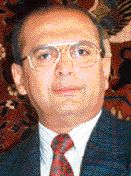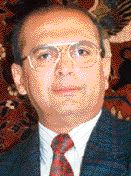
Al-Qirbi to YT: “The extension of the periods of parliamentarians… are all going to develop the democratic process and widen public participation.” [Archives:2001/04/Law & Diplomacy]
January 22 2001

To focus on the PGC’s stand in regard to the constitutional amendments and the council elections, Yemen Times filed an interview with Dr. Abu Bakr Al-Qirbi, the head of the political department of the PGC, and a prominent member of the Consultative Council.
Excerpts:
Q: How do you assess the role of the Local Councils in Establishing Local Governance in Yemen?
A: The upcoming national council elections are of great importance due to their potential in strengthening democracy and widening public participation. Through these councils, citizens will be able administer their own affairs and play a role in the development of their regions. Hence, public participation in these elections will lead to electing individuals capable of achieving developmental programs for their areas. This will consequently lead to the success of this experiment on a national level and be involved in many more projects in future for the various regions after implementation of these projects and plans.
Q: What will the duties and responsibilities of the councils be?
Will the councils represent the public 100% when its heads are appointed and not elected?
A: The local councils law gives a lot of authority to local councils because it is a modern law comparable to laws used in the area and in many emerging democracies. Unfortunately some people judge on the law before fully reading and understanding it. Even when they read it, they only look after the drawbacks and lacunae within it, ignoring all its positive aspects and the benefits it provides to the community. These individuals sadly interpret the law in a way that suits their individual or party interests and forget that the legislators of the law are bearing a national responsibility in drafting the law, which may include mistakes, but which can always be corrected through legislative and legal ways. There is no law whatsoever that does not have some drawbacks at least from certain specific viewpoints.
As for the appointment of the heads of the councils of governorates, I personally see no negativity in that especially when the law states that if confidence is lost in the governor or the head of the council, he could easily be replaced or removed consequent upon the demand of the elected council members. The role of the national councils is a developmental role for the region in question, as these councils are the direct choice of the public, hence their duty is mainly to serve their respective region.
Q: Some opposition parties decided to vote “NO” to the constitutional amendments. Will this affect the public participation in the elections? And if the public says “NO” to the amendments, will the elected councils still be legitimate? In this case, do you assume that the public would approve the amendments?
A: First of all, it is the opposition’s right to vote ” NO” to the constitutional amendments, but I personally believe that Yemenis have reached a level of awareness that enables them to see that the opposition’s stand represents a misunderstanding of the core of the amendments. All that the opposition is doing is creating an environment of panic and chaos without any justification. Despite the opposition’s actions, it is its right to say what it wants, and it is the people’s right to say what they want in regard to the amendments.
As for the public participation, I believe it will be significant because the referendum on the amendments will be carried out along with the national council elections. This is what we, the PGC, are much concerned about so that there would be a large participating percentage of the eligible voters in this elections, which will enable the public to voice its opinion in regard to the amendments.
The view that, if the public votes “NO” to the amendments then that would result in the illegitimacy of the national councils, is wrong. The national council elections have nothing to do with the constitutional amendments or with the outcome of the referendum. The only consequence of a “NO” vote to the amendments would be the preparation for the upcoming parliamentary elections in April 2001. This wrong interpretation of the consequences of the results of the referendum is an irresponsible act that is aimed at creating confusion among the public, nothing else.
Q: How do you evaluate Yemen’s previous experience with national councils? What will be the major difference between those older councils and the ones to be elected?
A: I believe that the upcoming national councils will be different form the previous ones because they will emerge in a democratic, not a single-party system. Forming these councils will depend on the free choice of the citizens, away from any interference by the state. The new national councils law grants local councils authority and control over the resources in their respective regions. Hence, these councils will be able to play an important national developmental role if the region’s voters elected the ones qualified for the position. Otherwise, if the wrong choice is made, the area will most probably not benefit from the council’s authority and will find it difficult to develop and improve its conditions.
Q: There have been no applications from any international organizations to observe the upcoming national council elections. How do you justify their stand?
A: First of all, these elections are for local councils, which do not reflect political differences or ideologies. Second of all, many international organizations see that there is no more need to observe elections in Yemen as they have seen that the previously held elections were tremendously successful and had little fraud and violations of electoral procedures
Q: Do you honestly believe that the constitutional amendments are actually needed at all? If yes, why were they connected to the national councils? In other words, why this timing? Will these amendments preserve the constitution’s principles that were signed when unification took place in 1990?
A: The constitutional amendments are necessary in our viewpoint as the PGC because they rectify some drawbacks and strengthen our democratic process, and not the contrary as some claim. These amendments also do not contradict any of our national and religious values of Islam. They don’t contract with the ruling system, Yemen’s revolutions and their principles, Yemeni people’s rights, and Yemeni unity. The extension of the periods of parliamentarians and of the president, and adding more specialities to the duties of the members of the consultative are all going to develop the democratic process and widen public participation. As for the connection between the referendum and the national council elections, the main reasons are economic and are geared to increase public participation.
In regard to some claims that the constitutional amendments contradict with the constitution formed after unification, this is obviously wrong, as the fundamental of principles of the constitution are not at all altered or changed by these amendments. I don’t imagine that anyone could accept having the constitution unchanged for an infinite time because the world is changing, so is Yemen. There must be changes and amendments made to the constitution to cope with these circumstances. It is enough to have the Islamic legislation, which is one of the main sources of the constitution being unchanged for a long span of time.
Q: What were the eligibility conditions for nomination to the national council elections? Do you support leading female figures from your party?
A: The conditions, in terms of age or qualifications, are quite clear and well presented. The general secretary of a council should be at least 35 years old, and must have a university degree. As for women, the PGC always is, and has always been supportive to the women’s movement and participation in the political life and in this case in the national councils. The reason for that is because women constitute half of the nation and three quarters of the nation are represented by women and mothers. We hope that we will be able to have some influential presence of women in the upcoming national councils.
Q: It is said that the PGC does not have genuine public support, but was rather able to gain many votes because of its use of the resources it controls, including funds, media, and military forces. What is your response to this viewpoint?
A: These are frequent accusations we receive which are aimed at casting some doubt in the abilities of the PGC and trying to create confusion and fear in some of its members. The PGC is that party which has the highest number of members and affiliates. Its publicity is the widest and it has among its members, the most widely accepted personalities including respected intellectuals, religious personalities, economists, and the most enlightened men in Yemen. Those who are trying to raise doubt about our party’s strength and popularity are probably living in a world of fantasy.
As for the ones who think that the PGC is using the state’s assets and facilities for its own sake, they should first look at what their parties’ spending and facilities which exceed our party’s facilities. From where did they get this money? It is sad to see that the inherent weakness in some parties turns into a medium to raise doubts, create chaos and hurl insults on others.
Q: It is obvious that the public has lost trust in the PGC’s program during 1993-1997. And afterwards, what does the PGC have to offer to convince the public to vote for it in the coming parliamentary elections? Is there a possibly to make a coalition government containing opposition parties after the new elections?
A: The claim that the public has lost trust in the PGC and its plans is obviously self-contradictory because the PGC is and will continue to be the party that, the people know, stands for moderation and balance, accomplishes achievements, and leads the country to a prosperous future. I do hope that the PGC would sit along with the accusers and criticizers to show them the achievements it had accomplished through the years in the economy and in the political life. It is unfortunate that even though international organizations and countries have admitted the accomplishments of the PGC, there still is a group that denies them. This group is like the ostrich hiding its head in the sand to refuse reality. The PGC has an announced program, which includes the viewpoint of the party in regard to national councils, and how they could serve to develop their respective regions, and how they should be a major part in building a prosperous Yemen.
Coming to the point of the possibility of joining a coalition to fight corruption and improve the economic conditions of the country, this reflects the ambitions by some other parties. The coalitions in the past only resulted in more corruption, and did not serve their purpose of diminishing it as some had claimed. I hope that the ones who suggest those proposals should think twice before proposing them so that they would not fall victims to their theorization and viewpoints that the PGC is the only party responsible for corruption. Everyone is involved in corruption and responsible for it, and the reports of the Central Organization for Control and Audit prove this fact.
——
[archive-e:04-v:2001-y:2001-d:2001-01-22-p:./2001/iss04/l&d.htm]


